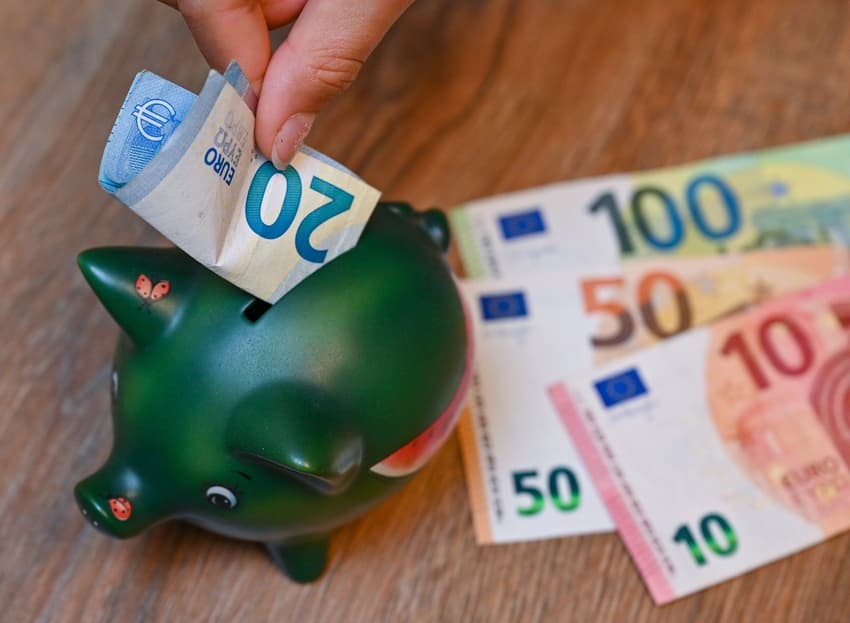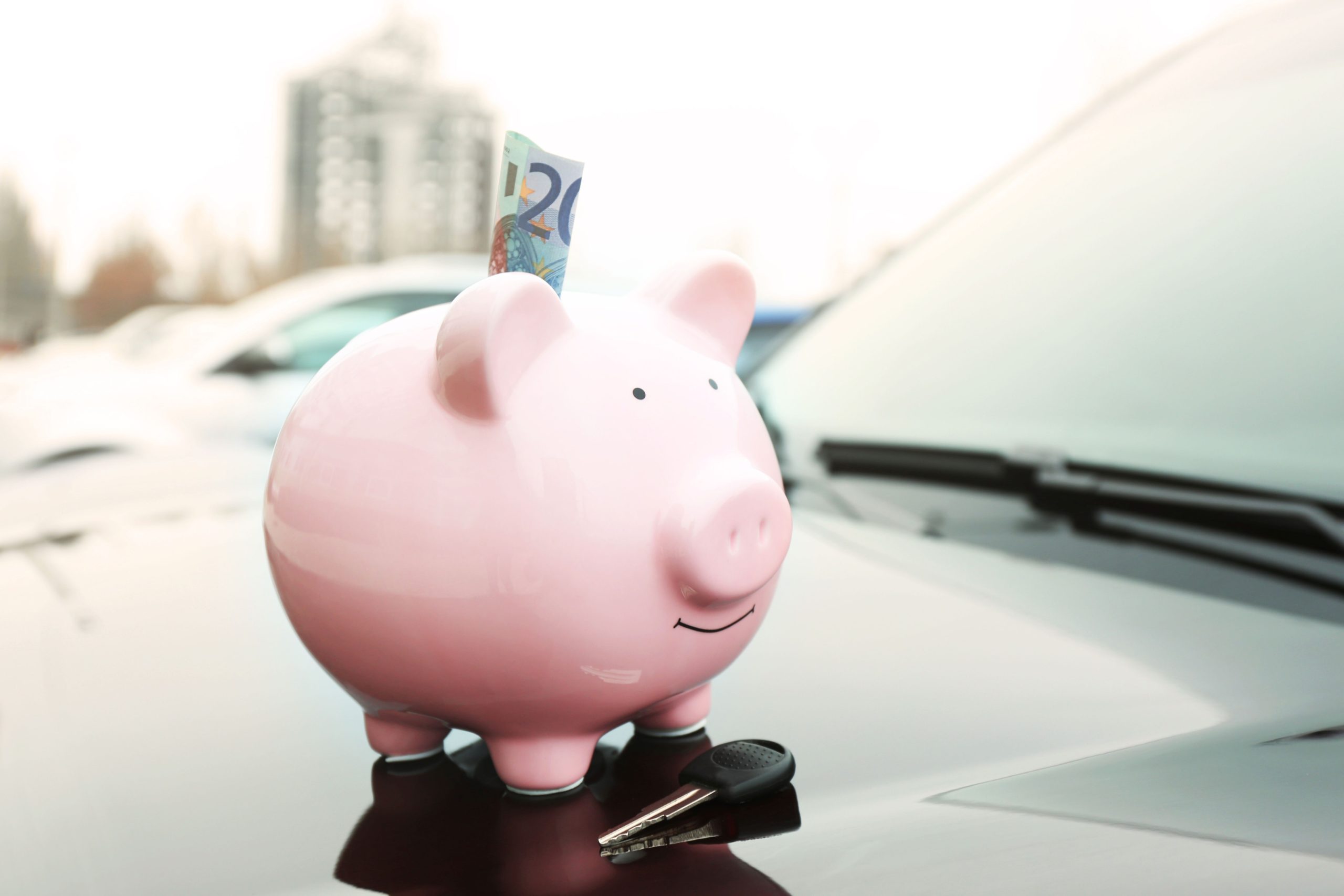How to grow your savings in Germany during high inflation

With savers hammered by high inflation, banks in Germany are offering unorthodox options to make your money last longer. So what's the best way to stop your savings getting consumed by the rising cost of living?
The last few years in Germany have been pretty tough financially for most people. People lost work during the Covid-19 pandemic, and then were hammered with the rising cost of living and energy prices caused by Russia’s invasion of Ukraine.
The once-solid property market has collapsed, and stock prices of even huge companies like Siemens Energy can be very volatile. Meanwhile, inflation current stands at 4.5 percent, so €100 will only be worth €95.5 in a year’s time if that rate holds.
All in all, it’s hard to know what to do with your money - that's if you’re lucky enough to have any money left.
READ ALSO: Germany sees record drop in property prices
An interesting and novel way around this is fixed deposits or “Festgeldzinsen”, according to analysis by consumer comparison portal Verivox. Inflation and interest are both so high that borrowers are desperate for money, and you can provide some for one year, even in relatively small amounts.
“The return of positive real interest rates is an important turning point for savers,” said Oliver Maier, Managing Director of Verivox Finanzvergleich GmbH.
This is being called a “Wende” or turnaround in investment.
READ ALSO: German Word of the Day: Die Wende
For the first time in decades Germany has interest rates higher than inflation, with some providers paying as much as 4.75 percent interest. With inflation at 4.5 percent in September and likely to fall, that’s effectively money for nothing.
For these high rates, you are best off looking at yearly fixed deposits at banks in other countries in Europe.
But there is a catch: your deposit is only legally protected after €100,000.

A piggy bank in Saarbrücken, Saarland. Photo: picture alliance/dpa/CosmosDirekt | AdobeStock_108314803
On the other hand, fixed deposits in German banks, where your deposit is always legally protected, aren’t currently worth your time or money. The real interest rate – the value after inflation – is sadly in the red, losing 1.18 percent annually.
Short term “daily” deposits which can be withdrawn at any time are not worth it at all, with much lower rates.
What about current accounts?
Even if you aren’t a savvy investor, almost everyone in Germany will have a current account. You might be looking at inflation eating away at your savings with worry. The good news is that some German banks have increased interest for current accounts too.
The highest for a current account is C24, the in-house bank of consumer portal Check24, which offers 4 percent.
If you prefer a more established credit institution, Santander has an impressive 3.7 rate for new customers, and ING and Deutsche Kreditbank have raised their interest rates from 1 to 3.5 percent until January.
This of course isn’t coming from the goodness of banks’ famously big hearts. Handelsblatt reports that there is competition returning to the sector as the deposit holdings of savings and cooperative banks fell in the first half of 2023 for the first time since the 2008 financial crisis.
Has inflation peaked?
Leading figures from the European Central Bank (ECB) met earlier this week in Greece to discuss policies. While there, Central Bank President Yannis Stournaras proudly mentioned that Greece’s economy is growing faster than Germany’s.
Due in part to aggressively high interest rates, inflation rate has been falling across Europe and now stands at 4.3 percent on average. But that’s still twice as high as the ECB want it to be.
READ ALSO: Why 2023 will be a better year to grow your savings in Germany
What about investment in general?
If you are thinking long term instead of just getting through this crisis, then experts at Nico Hüsch advise that broadly diversified equity funds – spread-betting with your money - are still the best investment in any portfolio that you invest in for the long term.
That means over 12 to 15 years. However, investments do always contain an element of risk.
Comments
See Also
The last few years in Germany have been pretty tough financially for most people. People lost work during the Covid-19 pandemic, and then were hammered with the rising cost of living and energy prices caused by Russia’s invasion of Ukraine.
The once-solid property market has collapsed, and stock prices of even huge companies like Siemens Energy can be very volatile. Meanwhile, inflation current stands at 4.5 percent, so €100 will only be worth €95.5 in a year’s time if that rate holds.
All in all, it’s hard to know what to do with your money - that's if you’re lucky enough to have any money left.
READ ALSO: Germany sees record drop in property prices
An interesting and novel way around this is fixed deposits or “Festgeldzinsen”, according to analysis by consumer comparison portal Verivox. Inflation and interest are both so high that borrowers are desperate for money, and you can provide some for one year, even in relatively small amounts.
“The return of positive real interest rates is an important turning point for savers,” said Oliver Maier, Managing Director of Verivox Finanzvergleich GmbH.
This is being called a “Wende” or turnaround in investment.
READ ALSO: German Word of the Day: Die Wende
For the first time in decades Germany has interest rates higher than inflation, with some providers paying as much as 4.75 percent interest. With inflation at 4.5 percent in September and likely to fall, that’s effectively money for nothing.
For these high rates, you are best off looking at yearly fixed deposits at banks in other countries in Europe.
But there is a catch: your deposit is only legally protected after €100,000.

On the other hand, fixed deposits in German banks, where your deposit is always legally protected, aren’t currently worth your time or money. The real interest rate – the value after inflation – is sadly in the red, losing 1.18 percent annually.
Short term “daily” deposits which can be withdrawn at any time are not worth it at all, with much lower rates.
What about current accounts?
Even if you aren’t a savvy investor, almost everyone in Germany will have a current account. You might be looking at inflation eating away at your savings with worry. The good news is that some German banks have increased interest for current accounts too.
The highest for a current account is C24, the in-house bank of consumer portal Check24, which offers 4 percent.
If you prefer a more established credit institution, Santander has an impressive 3.7 rate for new customers, and ING and Deutsche Kreditbank have raised their interest rates from 1 to 3.5 percent until January.
This of course isn’t coming from the goodness of banks’ famously big hearts. Handelsblatt reports that there is competition returning to the sector as the deposit holdings of savings and cooperative banks fell in the first half of 2023 for the first time since the 2008 financial crisis.
Has inflation peaked?
Leading figures from the European Central Bank (ECB) met earlier this week in Greece to discuss policies. While there, Central Bank President Yannis Stournaras proudly mentioned that Greece’s economy is growing faster than Germany’s.
Due in part to aggressively high interest rates, inflation rate has been falling across Europe and now stands at 4.3 percent on average. But that’s still twice as high as the ECB want it to be.
READ ALSO: Why 2023 will be a better year to grow your savings in Germany
What about investment in general?
If you are thinking long term instead of just getting through this crisis, then experts at Nico Hüsch advise that broadly diversified equity funds – spread-betting with your money - are still the best investment in any portfolio that you invest in for the long term.
That means over 12 to 15 years. However, investments do always contain an element of risk.
Join the conversation in our comments section below. Share your own views and experience and if you have a question or suggestion for our journalists then email us at [email protected].
Please keep comments civil, constructive and on topic – and make sure to read our terms of use before getting involved.
Please log in here to leave a comment.